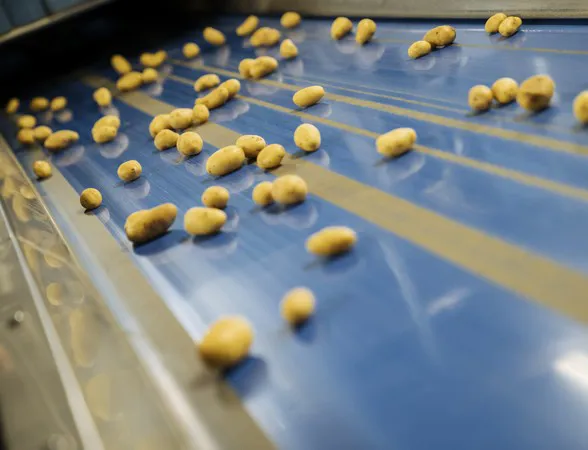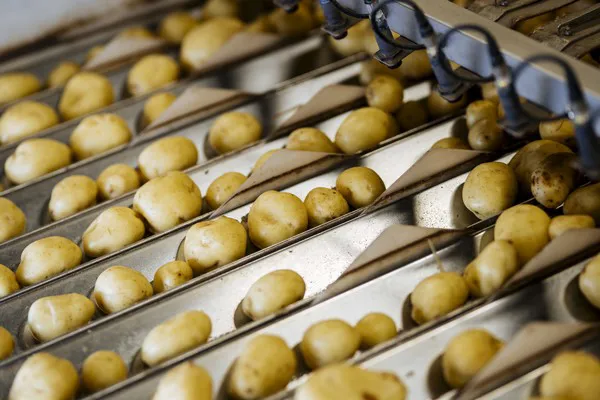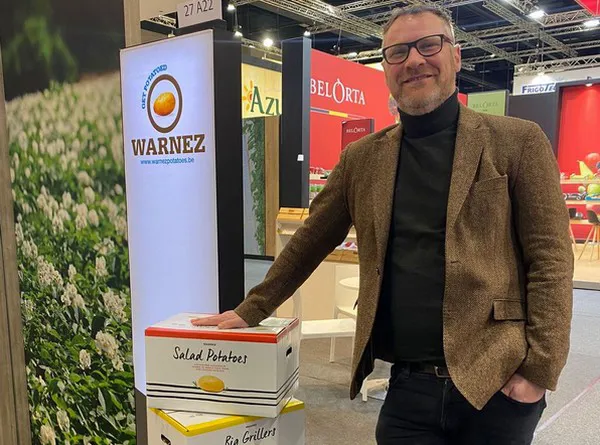Costs keep rising, consumer demands keep changing, and sustainability is becoming increasingly important. In today's market, distinguishing yourself is, therefore, becoming more and more critical. Kurt De Nys has a clear vision of how to do so with Warnez Potatoes. "Since I became CEO, our approach has been to work more with clients and ensure we achieve an optimal quality product. To do so, we have had to reinvent our entire process. And that's working," he begins.
The growth this Belgian potato processor wants to achieve depends on three factors, says Kurt. The first step, he explains, lies in the production process. "You can have all the goals you want, but the most crucial thing is that the potatoes are still of good quality. We have 300 hectares of cultivation, but it’s not in the best part of Belgium. So, we're trying out irrigation. Sustainability-wise, that's treading a fine line. We don't want to create an imbalance by using other segments' water for our potatoes."
"Still, it's needed because irrigating results in 40 to 50% increased volume and improved quality. We're working with Medhinbio, specialists in hardy varieties and residue-free cultivation. Together, we've started several trial fields, which have been growing for two years now and have shown fantastic results. We want to commercialize this soon and convert it into our cultivation program," Kurt explains.
"We also try, every month, to identify pitfalls. For example, we have a new device that monitors the potatoes throughout the process and considers things like drop speed and bump hazards. We want to limit damaging the potatoes." During grading, minimizing food waste is another vital component.

Kurt: "Many of our customers have specific demands for things like size and variety. It's, thus, vital to have a process that removes unwanted potatoes and ensures the good ones aren't discarded. That's why we recently invested in a new optical sorting machine, which allows us to tap into several additional channels. In the context of sustainability, we can now also supply buyers with category B and C potatoes. It used to be good and poor quality, but there's plenty of space between these extremes. There are plenty of clients for the not-top categories, too. They have different requirements or serve different target groups. It's nice to give them the lesser-quality potatoes instead of having to throw them away as fodder. That, in turn, saves a huge amount of waste."
The final, and, according to Kurt, perhaps most important point is storage. "We ultimately want to offer year-round Belgian potatoes. That's also what many major retailers demand. I think we're very close to realizing that, which would be unique for the Belgian market. We started potato storage testing a while ago. Those experiments ranged from throwing potatoes into the shed to see what would happen to placing them in a temperature-controlled cabinet and checking them daily. Using those results, we worked something out with Tolsma Grisnich that lets us monitor and adjust our storage, every day, according to customer wishes. That's a vital step toward meeting year-round demand," he says.

This was, however, no mean feat for Warnez. "Obviously, it costs plenty of money, but so does getting premier potatoes from Egypt, Israel, or southern Spain. Then it's better to have them in local storage because retailers don't want to pay full price for those high-end potatoes either. Packers carry most of the surcharges. It's wonderful to have taken the first step to eventually not needing those potatoes. We eventually want to link up to the German season."
"All in all, it was a substantial investment, especially for an SME. Luckily, we can use VLIF [Flemish Agricultural Investment Fund - ed] grants to bear some of the financial brunt. It was also needed from both an economic and sustainability perspective. We want Belgian potatoes to again be recognized as one of the better foods grown cheaply and with little crop protection. It must regain its status as a product of which we're proud," states De Nys.
The packaging issue is another important aspect of that sustainability. "We're always discussing what consumers and they want with our customers. For instance, these days, we have the I AM Green packaging. Paper is a hot item, but it's difficult to recycle and uses a lot of water. We prefer cellulose. It resembles plastic, which makes it hard to convince consumers, but it's completely recyclable. We're also in talks with HelloFresh, one of our good partners, to deliver potatoes with no packaging. They can then add x number of loose potatoes to their meal boxes. We want to brainstorm these types of things."
According to Kurt, this segment is where potatoes' future lies. "Convenience and meal boxes are becoming increasingly popular and are showing tremendous growth," he continues. "We supply HelloFresh in Germany, the Netherlands, and Flanders. France will probably join soon, too, since this trend is genuinely booming. People want a quick way to prepare meals, so we're also tweaking more and more of our machines to meet this market demand. We're discussing setting up a kind of calendar with HelloFresh too. Then, throughout the year, they can use the tastiest product available at that time. We want them to know when to offer potato dishes when the best Belgian potatoes are available, and advise them when to go for other options when they're not."
"We're currently focusing on all these factors. That's perhaps a little atypical, but it works for us. Our growth reflects that, and we happily keep doing it," Kurt concludes.
For more information: Kurt De Nys
Kurt De Nys
Warnez Potatoes
Marialoopsesteenweg 2L
B-8700 – Tielt - België
+32 051 400812
[email protected]
www.warnezpotatoes.be











